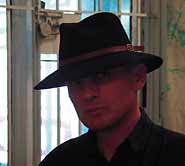
Current Issue Highlights More Readings DA Home About Direct Art
DARK ON DARKSix artists interviewed by DAKOTA LANE

IVAN KUSTURA
There’s nothing terribly deep about laughter. Laughter doesn’t teach you something. But suffering, that’s deep. If I’m doing something dark, I don’t think of it as dark, I sometimes find it to be beautiful, because it reflects myself. With all my work I feel like I am a spectator, just like you, only I happen to see it first. When you make a line, you really don’t know how it’s going to come out, unless you have a ruler. And how this fits with whatever follows it and whatever preceded it, is an accident. Your hand is directed by your head. When you condition it to do strange things, sometimes tempting that devil too much, it can get out of control. It’s Faustian and I owe to it everything I’ve ever done.
 Ivan Kustura, Untitled, oil on canvas, 60" x 50"
Ivan Kustura, Untitled, oil on canvas, 60" x 50"
Once in a while I feel I might be depressed. When I’m happy I don’t give a damn about painting. I had a girlfriend last winter. She was much younger than me. She was 22. She would sit on my lap and she would pull up her T-shirt and it would cross my mind: "Fuck painting!" Maybe painting is cathartic. In the end you do come to a place of clarity.
On war: I went down to see the smoke coming out. I was really transfixed by the images when it happened. The plane is not supposed to do that. People defied the life-preserving instinct.
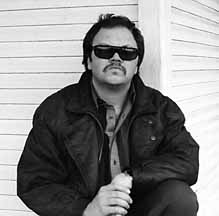
TOM McKEE
A lot of people think my work is really scary and frightening and stuff. (A figure in one of his pieces) came from a reoccurring dream I had about a creature living upstairs. It was an incredibly macabre dream. I was lead to this attic and eventually encountered this being who had been eating children ... When I woke up I was almost more scared about not being scared than I was actually scared by the dream. It was kind of disturbing that I woke up not being scared.
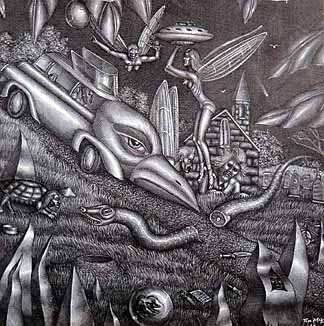 Tom McKee, Willie at The Crossroads, ink and prismacolor, 20" x
22"
Tom McKee, Willie at The Crossroads, ink and prismacolor, 20" x
22"
I like supernatural horror movies; I like older films that don’t deal with the mutilation aspect. I guess the work is therapeutic, necessary to maintain sanity. I also work 40 hours a week in a machine shop and teach an art class. I’ve been working on these black and white drawings for 15 years. I draw in a really strange way and I find inspiration from some really squirrelly places. Like as a kid, I stared at watermarks on the ceilings and tried to interpret them.
I’ve always had this feeling like I was born out of time or in the wrong place, like I generally didn’t belong. My work is like trying to create my own world to escape to.
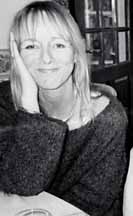
JANE ANDREWS
I don’t really think of it as dark. When people call it dark, it surprises me. When I first started painting about 10 years ago, I had an awful lot to say. I think because it’s strong people will say it’s dark. I make a big thing to avoid melodrama. I want to cut that and subvert that, maybe with details, maybe with humor sometimes.
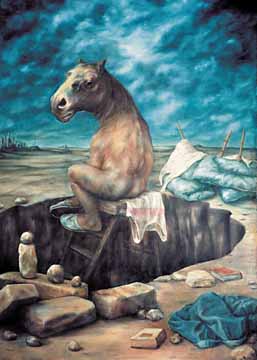 Jane Andrews, Some Days it Does, oil on canvas, 178 x 130cm
Jane Andrews, Some Days it Does, oil on canvas, 178 x 130cm
I haven’t been horrified by my own work, but if the painting doesn’t make me stop when I see it, it’s not working. It has to have a presence. To be honest, it’s just a way of expressing, of interpreting. It’s a language that comes naturally to me. It’s the way it comes out. If it’s right, it’s right and that’s the way it is.
To a certain extent, the painting does take over. I’m working on something new and the painting doesn’t have a life. There’s a point when it goes on it’s own. A dialogue happens. Once a dialogue begins, I’m so absorbed.
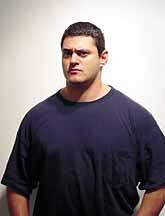
TRISTAN SCHANE
It’s certainly not a deliberate direction. I don’t think okay, this is good and dark. I don’t go, oh, this’ll really put people on edge or this will really contrast with the standard bowl of fruit.
The worst thing I hear, and I hear it so often, is "it’s disturbing." In that sort of dismissive tone. It seems to me to be really closed-minded. It always strikes me that people have a very different idea about what art is than I do; when I’m thinking about art I’m never thinking of an expressive landscape of the Hamptons. I’m always shocked when people think my art is horrifying: there’s no gore, there’s no violence, there’s no John the Baptist head on the plates.
 Tristan Shane, Teleautomata: Evolution, oil on aluminum
panel, 48" x 48"
Tristan Shane, Teleautomata: Evolution, oil on aluminum
panel, 48" x 48"
I don’t try and analyze my paintings. I’m not good at that. I can’t interpret my own dreams, for example. When I paint it, I know if it makes sense. I know if I’ve succeeded if it’s not just a meaningless assemblage of images.
The only time I was shocked by my own work is when I was doing a commissioned illustration job for (horror writer) Clive Barker’s "The Book of Blood." One of the paintings was a haunted house where some terrible crime had been committed. They didn’t tell me what the crime was. I had this shot of this floor with naked bodies of children all covered in blood and a man standing there with his pants pulled down to his ankles. After I painted it I was really shaken up by it. They used it. They didn’t care.
My mother loves my stuff. She’s one of my favorite people to show paintings to and one of the few I show paintings to in different stages. She gets what I’m doing. I get the most productive feedback from her.
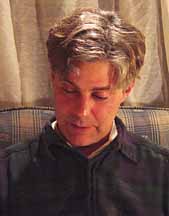
GEOFF PARKER
Yeah, they’re dark, but not on purpose. No one’s getting killed in them. They’re mysterious, that’s a better word. It’s not a practiced darkness; it came naturally. I’ve been doing them since I was a kid, 16, 17.
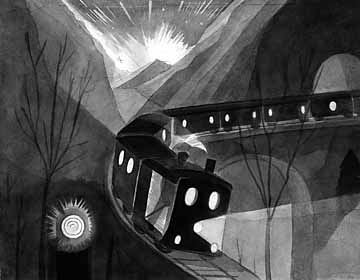 Geoff Parker, Night Train, pen and ink wash, 8.5" x 11
Geoff Parker, Night Train, pen and ink wash, 8.5" x 11
I take walks at night and you just see all these houses lit up at night. You kind of want to float over to them to get to that place of warmth. Some houses I invent. I’ll invent houses and then have them lit up. There aren’t any messages in my work, just images I like to see.
I always see myself as getting further and further into the country. You can be alone up here, it’s nice.
If I’m not doing my work, it starts getting depressing. I end up having to twist my own arm to do it, but once I get started again, I’m fine.
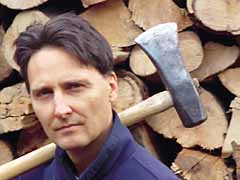
TIM SLOWINSKI
I consider my work to be truthful, but other people see it as dark because reality is very grim. My current paintings deal with social and political commentary so when people see it they think it’s all dark and depressing but it’s just the truth.
This painting I’m working on now, for example, is about health care and the insurance guy is this greedy demonic pig trying to extract money from a sick person.
Surprisingly, the people who buy them have occupations that are being depicted in the paintings. I’ll sell paintings to doctors, stock brokers, real estate developers. There’s a comic element to it and it helps raise them above their profession because they can see the absurdity of it.
 Slowinski, Crunchy Brains Cereal, oil on canvas, 36" x 38"
Slowinski, Crunchy Brains Cereal, oil on canvas, 36" x 38"
Many people have told me that I should paint less depressing pictures, more uplifting, especially my mother. They don’t understand that a true artist doesn’t choose what they paint. The choice is made for them, they paint what they feel they have to or need to.
I’ll get an idea, kind of suddenly, and I’ll do a little sketch of it. I make everything up. I’m not inspired by images in the world, just in my head.
The world needs a lot of work. It could be a good place.
Painting sustains me. At different periods in my life I was pushed into a very dark place and only by painting could I get out of it. If I don’t paint, I get very depressed and anxiety-ridden. It happens. It’s hard for some people to understand.
Current Issue Highlights More Readings DA Home About Direct Art